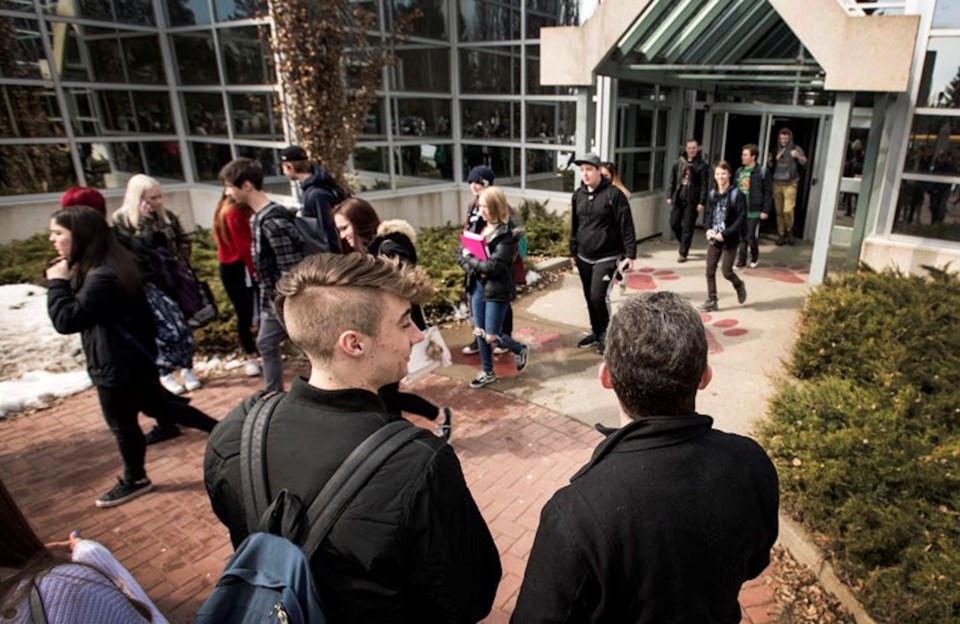St. Albert will take on the responsibility of improving traffic flow and safety around Bellerose Composite High School — something identified as a considerable need with the impending $46.3 million renovation and expansion of the school — instead of the provincial government.
Under normal circumstances, the city requires developers to pay for any new traffic-related infrastructure, such as crosswalks or traffic signals deemed necessary as a result of new development, but in this case, the city's policy clashes with provincial government policy, which requires municipalities to ensure that all school sites are appropriately serviced including traffic measures, according to a report written by Dean Schick, the city's manager of transportation, as well as Kathleen Short, a city architectural and development officer.
This policy impasse led administration to ask council for direction on how to move forward on May 14, as Schick and Short wrote the provincial government warned that “unforeseen increased costs” for the Bellerose renovation would lead to project delays or even put the project “at risk for completion.”
Administration had recommended that the city stand its ground and require the province to pay for any necessary traffic infrastructure so that a precedent isn't set for other construction projects, but council voted otherwise on May 14 during a special city council meeting, directing administration to take on the improvements and issue a development permit to Alberta Infrastructure.
“We're going to be fine with funding this but can we just add this to the download list,” Mayor Cathy Heron said during the meeting, implying that this is another example of the provincial government ‘downloading’ costs onto municipalities that many think should be provincial responsibility.
“Bill 20 is telling us to stay in our lane, to not do anything when it comes to healthcare or education, but here we are spending taxpayer dollars,” she said. “We would never give a permit like this to a private developer ever because growth should pay for growth.”
Many other members of council echoed Heron's argument.
“I could probably use some pretty harsh words for the province backing us into a corner like this,” said Coun. Natalie Joly. “We're essentially paying not only for provincial responsibility but also for neighbouring municipalities [because] it's not just St. Albert young people who are attending Bellerose — this is a regional school.”
“St. Albert's being expected to foot the bill so I'm supporting this but really frustrated.”
Coun. Wes Brodhead, Coun. Sheena Hughes, and Coun. Mike Killick all commented that traffic around Bellerose High School is already hectic, and traffic improvements should probably be done regardless of the expansion project, which is expected to add space for 275 more students to attend.
“It's unfortunate that we're the ones who are doing this but the school has to be built out and we've also put a lot of money into a lot of schools when we looked at Safe Journeys to School and that was not a debate about whether or not we wanted to do it, it was about safety,” said Hughes. “These improvements are also about safety.”
Coun. Shelley Biermanski, the lone opposition vote, said she thought the city needed to stick to its policy and require the province to pay for the improvements, regardless of potential project delays.
“That's the difficult part for me,” she said. “I think it sets a precedent for people to delay or not get things in correct order to the city and it puts a pressure on the city to have to come up with money at the drop of a hat.”
School board relieved
St. Albert Public Schools spokesperson Paula Power said in an email after the vote that the division is “extremely relieved and grateful” for council's decision.
“We recognize the difficult position that municipalities are in when it comes to funding and we appreciate that this was not an easy decision for council, but a necessary one to ensure not only that the project stays on track but that student and traffic safety around the school remains a priority,” Power said.
Power also said the expansion is the second of three phases of the division's “high school accommodation” project, the first phase of which was the construction and opening of the new Paul Kane High School.
“The third phase is the construction of a new, third high school,” she said.“The Bellerose expansion gives us some breathing room until we receive the land and funding to build our third high school.”
Although Schick and Short's report says that without the city taking on the responsibility of handling traffic improvement the Bellerose renovation could be at risk, Benji Smith, the press secretary for Minister of Infrastructure Pete Guthrie, said the project was not at risk of cancellation regardless of council's decision.
“As is the case with all school projects in Alberta, including expansions and modernizations of existing schools, a municipality’s role is to provide a site that is serviced and ready for the project’s construction and operation,” Smith said.
“Site readiness includes utilities such as water and sewer, as well as any required roads and traffic signals.”
Schick and Short's report explains that a traffic impact assessment completed by the province last fall showed that a potential improvement would be to install a set of traffic signals at the intersection of Giroux Road and Lacombe Drive/Dunfield Crescent, however, additional measures may be needed at the school's two parking lot entrances off of Giroux Road.
Installing traffic signals could cost between $300,000 to $350,000, however, “the final costs will be subject to confirmation of required improvements and subsequent design and may be influenced by timing of construction,” Schick and Short wrote.
Council heard that once administration determines exactly what kind of traffic improvements are required, a project charter and budget will be presented to council for approval. No deadline was given.
Construction at Bellerose is expected to take place this summer.




